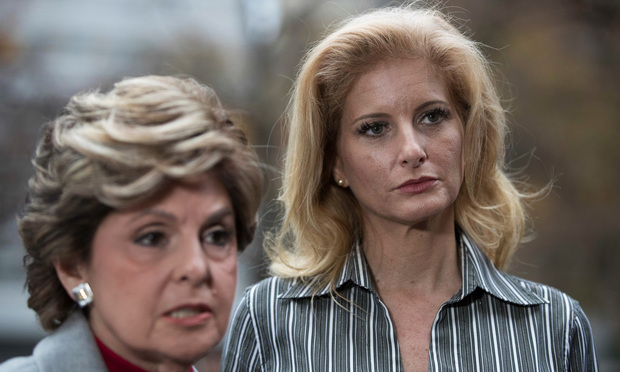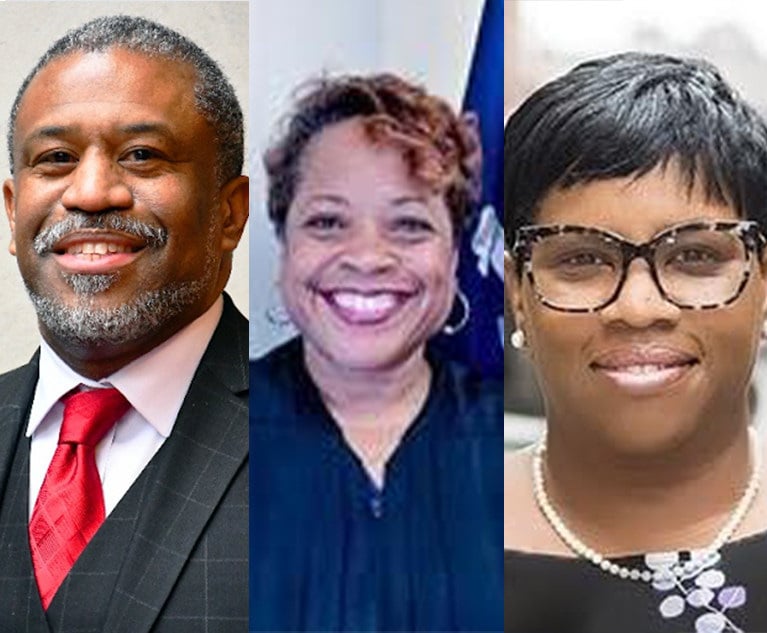Trump Pushes Back on Ex-'Apprentice' Contestant's Effort to Get Info About More Accusers
President Donald Trump is pushing back against an effort by a woman suing him for defamation for the president to produce information about other women who have accused him of sexual harassment, deriding it as a means to harass and distract him from his official duties.
September 17, 2018 at 03:23 PM
5 minute read
 Summer Zervos (right) with attorney Gloria Allred. Photo Credit: Mary Altaffer/AP
Summer Zervos (right) with attorney Gloria Allred. Photo Credit: Mary Altaffer/AP
President Donald Trump is pushing back against an effort by a woman suing him for defamation for the president to produce information about other women who have accused him of sexual harassment, deriding it as a means to harass him and distract him from his official duties.
Summer Zervos, a former contestant on NBC's “The Apprentice” who appeared on the show when Trump was a host and who alleged Trump groped her in 2007, argued that information about a dozen other women who accused Trump of sexual misconduct is relevant to her defamation suit against the president because it might show patterns of behavior—namely that he lures women under false pretenses and subjects them to sudden sexual contact—and that he acted maliciously.
Zervos alleged Trump kissed her on the lips during a meeting at Trump Tower and that he subjected her to unwanted kissing and touching during a private meeting at a Beverly Hills hotel.
Zervos' suit centers on Trump's denials of Zervos' allegations—in one statement he said that he never met Zervos at the hotel where she said the groping occurred or “greeted her inappropriately.”
“That is not who I am as a person, and it is not how I've conducted my life,” Trump said, according to court papers.
Zervos said Trump defamed her by calling her a liar.
Trump “did not merely call Ms. Zervos a liar,” said Zervos' lawyers in a motion to compel. “He insisted unequivocally that he had never inappropriately touched any woman.”
Zervos argued that information about the other accusers could speak to both Trump's state of mind and his credibility. Trump's attorneys have argued that his allegedly defamatory statements amounted to heated campaign rhetoric.
Many of the other accusers said they were assaulted in “virtually” the same way that Zervos was, she alleged: Trump “would proceed to kiss them on the mouth and grope them, including by grabbing their breasts, buttocks or vaginas.”
Zervos cited as an example allegations by adult film actress Stephanie Clifford, who performs as Stormy Daniels, who said Trump invited her to meet him at a hotel in 2007 under the pretense of discussing a business opportunity but instead began touching her and discussing a previous sexual encounter they had.
Michael Cohen, Trump's former personal lawyer, admitted last month in federal court to making a $130,000 payment to Clifford on Trump's behalf to keep her encounters with Trump from going public.
Accusers identified in Zervos' suit made their allegations public in the weeks leading up to the 2016 presidential election and Trump issued blanket denials of any sexual misconduct in speeches and tweets.
“Nothing ever happened with any of these women,” Trump tweeted in October 2016. “Totally made up nonsense to steal the election.”
Zervos is represented by Cuti Hecker Wang partners Mariann Meier Wang and Eric Hecker and associates Daniel Mullkoff and Heather Gregorio. Wang declined to comment.
In opposition papers, the lawyers defending Trump in the defamation case argue that information about Trump's other accusers is not relevant to the Zervos case, characterizing the motion as a fishing expedition that would turn the case into a series of mini-trials.
Trump's lawyers also note that none of the other accusers identified in Zerovs' motion have come forward with lawsuits of their own.
Kasowitz Benson Torres attorneys Marc Kasowitz, Christine Montenegro and Paul Burgo are defense counsel to Trump in the defamation case.
Trump's efforts to thwart Zervos' lawsuit, which was filed in state court in Manhattan, have proven unsuccessful thus far: Earlier this year, Manhattan Supreme Court Justice Jennifer Schecter, who presides over the case, found that Trump is not immune from the suit and in June the New York Court of Appeals declined to hear Trump's appeal to grant a stay of proceedings in the case.
Trump is appealing Schecter's ruling on the immunity matter. This month, the parties agreed to a stipulation that provides for Trump to give written answers to deposition questions.
Read more:
Trump Wants NYCOA to Freeze Suit by Former 'Apprentice' Cast Member
Stormy Daniels Sues Trump Over Tweet
Q&A With Gloria Allred on the Business of Law in the Age of #MeToo
This content has been archived. It is available through our partners, LexisNexis® and Bloomberg Law.
To view this content, please continue to their sites.
Not a Lexis Subscriber?
Subscribe Now
Not a Bloomberg Law Subscriber?
Subscribe Now
NOT FOR REPRINT
© 2025 ALM Global, LLC, All Rights Reserved. Request academic re-use from www.copyright.com. All other uses, submit a request to [email protected]. For more information visit Asset & Logo Licensing.
You Might Like
View All
Justice 'Weaponization Working Group' Will Examine Officials Who Investigated Trump, US AG Bondi Says

Lawyers Across Political Spectrum Launch Public Interest Team to Litigate Against Antisemitism
4 minute read
'Landmark' New York Commission Set to Study Overburdened, Under-Resourced Family Courts

Trending Stories
- 1States Accuse Trump of Thwarting Court's Funding Restoration Order
- 2Microsoft Becomes Latest Tech Company to Face Claims of Stealing Marketing Commissions From Influencers
- 3Coral Gables Attorney Busted for Stalking Lawyer
- 4Trump's DOJ Delays Releasing Jan. 6 FBI Agents List Under Consent Order
- 5Securities Report Says That 2024 Settlements Passed a Total of $5.2B
Who Got The Work
J. Brugh Lower of Gibbons has entered an appearance for industrial equipment supplier Devco Corporation in a pending trademark infringement lawsuit. The suit, accusing the defendant of selling knock-off Graco products, was filed Dec. 18 in New Jersey District Court by Rivkin Radler on behalf of Graco Inc. and Graco Minnesota. The case, assigned to U.S. District Judge Zahid N. Quraishi, is 3:24-cv-11294, Graco Inc. et al v. Devco Corporation.
Who Got The Work
Rebecca Maller-Stein and Kent A. Yalowitz of Arnold & Porter Kaye Scholer have entered their appearances for Hanaco Venture Capital and its executives, Lior Prosor and David Frankel, in a pending securities lawsuit. The action, filed on Dec. 24 in New York Southern District Court by Zell, Aron & Co. on behalf of Goldeneye Advisors, accuses the defendants of negligently and fraudulently managing the plaintiff's $1 million investment. The case, assigned to U.S. District Judge Vernon S. Broderick, is 1:24-cv-09918, Goldeneye Advisors, LLC v. Hanaco Venture Capital, Ltd. et al.
Who Got The Work
Attorneys from A&O Shearman has stepped in as defense counsel for Toronto-Dominion Bank and other defendants in a pending securities class action. The suit, filed Dec. 11 in New York Southern District Court by Bleichmar Fonti & Auld, accuses the defendants of concealing the bank's 'pervasive' deficiencies in regards to its compliance with the Bank Secrecy Act and the quality of its anti-money laundering controls. The case, assigned to U.S. District Judge Arun Subramanian, is 1:24-cv-09445, Gonzalez v. The Toronto-Dominion Bank et al.
Who Got The Work
Crown Castle International, a Pennsylvania company providing shared communications infrastructure, has turned to Luke D. Wolf of Gordon Rees Scully Mansukhani to fend off a pending breach-of-contract lawsuit. The court action, filed Nov. 25 in Michigan Eastern District Court by Hooper Hathaway PC on behalf of The Town Residences LLC, accuses Crown Castle of failing to transfer approximately $30,000 in utility payments from T-Mobile in breach of a roof-top lease and assignment agreement. The case, assigned to U.S. District Judge Susan K. Declercq, is 2:24-cv-13131, The Town Residences LLC v. T-Mobile US, Inc. et al.
Who Got The Work
Wilfred P. Coronato and Daniel M. Schwartz of McCarter & English have stepped in as defense counsel to Electrolux Home Products Inc. in a pending product liability lawsuit. The court action, filed Nov. 26 in New York Eastern District Court by Poulos Lopiccolo PC and Nagel Rice LLP on behalf of David Stern, alleges that the defendant's refrigerators’ drawers and shelving repeatedly break and fall apart within months after purchase. The case, assigned to U.S. District Judge Joan M. Azrack, is 2:24-cv-08204, Stern v. Electrolux Home Products, Inc.
Featured Firms
Law Offices of Gary Martin Hays & Associates, P.C.
(470) 294-1674
Law Offices of Mark E. Salomone
(857) 444-6468
Smith & Hassler
(713) 739-1250






